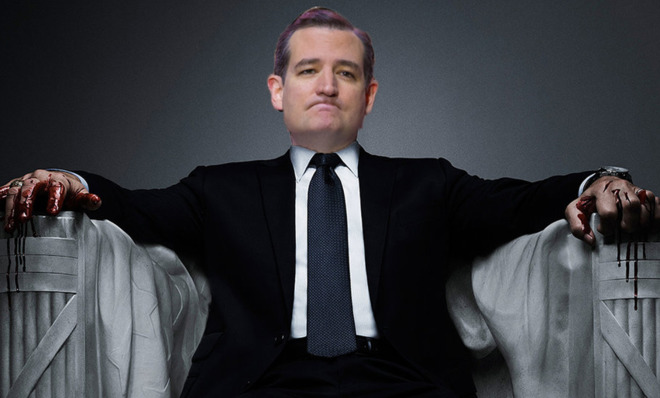Why Ted Cruz is the real-life Frank Underwood
The senator from Texas may not be a sociopathic murderer. But he is the most shamelessly Machiavellian player in Washington.


Most of the press coverage of the just-completed CPAC conference focused on Rand Paul's victory in the straw poll for the second year in a row. But I'm far more interested in and concerned about the man who moved up from a seventh place showing a year ago to a runner-up position last weekend: Texas Sen. Ted Cruz.
All of my political instincts tell me that if Cruz ended up as the Republican nominee, he'd be far too ideologically extreme to appeal to mainstream voters. He would lose in a landslide, demonstrating far more vividly than the recent defeats of John McCain and Mitt Romney that, at least when it comes to national-level contests, the GOP is undergoing an electoral implosion.
That might cheer Democrats, but I don't consider it a good thing. The health of a democracy depends, in part, on closely matched competition between two strong parties and the regular alternation of power between them.
The Week
Escape your echo chamber. Get the facts behind the news, plus analysis from multiple perspectives.

Sign up for The Week's Free Newsletters
From our morning news briefing to a weekly Good News Newsletter, get the best of The Week delivered directly to your inbox.
From our morning news briefing to a weekly Good News Newsletter, get the best of The Week delivered directly to your inbox.
The problem with Cruz is not only that he's right-wing. Cruz is a real-life Frank Underwood, the ruthlessly ambitious politician at the center of Netflix's blockbuster TV series House of Cards. Like the fictional Underwood, Cruz is brilliant, cunning, and audacious. He is usually several steps ahead of his rivals, and indifferent to policy except as a vehicle to fuel his own rise to power. In a town filled with overconfident would-be Masters of the Universe, Cruz stands out as the most shamelessly Machiavellian man in Washington. And that should worry anyone who cares about the future of American politics.
Let me be perfectly clear: I don't at all mean to imply that Cruz's ambition bleeds over into sociopathic behavior, with him bumping off anyone who threatens to thwart his rise. Underwood's murderousness is an amped-up, funhouse version of Washington in which the bloodthirsty lust for power gets acted out far more literally than it (thankfully) ever does in real life. But that doesn't mean the more muted, real-life version isn't troubling.
Most Washington pols have mixed motives, combining sometimes pathological levels of self-regard with genuine public spiritedness. They want to further their own careers while also improving the country — and they often make the mistake of convincing themselves that pursuing the first automatically advances the second.
But Cruz is different. Like Frank Underwood, he's the smartest, most relentless guy around, and everything he does is motivated by the unalloyed drive for self-aggrandizement.
A free daily email with the biggest news stories of the day – and the best features from TheWeek.com
Don't believe me? Consider his history.
From the time he got to college, Cruz impressed his teachers with his brilliance. On the way to earning plaudits as a champion debater and graduating cum laude from Princeton, Cruz convinced his undergraduate adviser, Robert P. George, that he was "intellectually and morally serious." "I'd have predicted that he would be a professor, not a politician," George told The New York Times in 2012. Alan Dershowitz was similarly impressed by Cruz's performance at Harvard Law School, describing him as "off-the-charts brilliant."
After graduating magna cum laude from law school, Cruz clerked first for J. Michael Luttig of the U.S. Fourth Circuit Court of Appeals in Virginia and then for William Rehnquist, making Cruz the first Hispanic in history to clerk for a chief justice of the Supreme Court. Six years later, at the age of 32, he argued his first case before the nation's highest court. While serving as Texas solicitor general from 2003 to 2008, he made oral arguments before the court a total of nine times — more than anyone currently serving in Congress.
As I said, Cruz has a formidable mind. But he's also shown considerable political savvy. He managed an upset victory against the sitting lieutenant governor of Texas, David Dewhurst, in the 2012 Republican senatorial primary by reading the Republican electorate correctly and running to Dewhurst's right. That led to a 16-point victory in the general election, landing Cruz in the U.S. Senate — his first elective office — at the age of 42.
It didn't take him long to get noticed in the nation's capital. Roughly a month after arriving, he attacked Chuck Hagel during his confirmation hearing for secretary of defense. A month after that, he condescendingly lectured Sen. Dianne Feinstein about the Second Amendment during debate about the (failed) assault weapons ban. He has proposed abolishing the IRS. He delights in denouncing Barack Obama as "the most radical president this nation's ever seen," and in warning that "we are facing…the epic battle of our generation, quite literally the battle over whether we remain a free market nation."
And then there was the upstart junior senator's 23-hour quasi-filibuster in favor of defunding ObamaCare, and his role in leading the party to support the government shutdown last fall. Both were undertaken over the objection of leading Republicans. Both failed to achieve their stated goals. Both contributed to the GOP taking a hit in the polls. When it was all over, senior members of his party were livid. Evaluated by normal Washington rules, it looked like Cruz had committed a horrible blunder.
But to come to that conclusion is to miss the rationale behind his actions entirely. The shutdown fiasco was Cruz's most Underwoodian moment, because he must have known all along that his gambit never would have worked. The only possible benefit could have been to Cruz himself.
Perhaps more than anyone in Washington, Cruz understands the revolutionary dynamic of politics in the age of social media. Why follow the traditions of the Senate — spending a decade or more learning its labyrinthine rules, rising slowly through its ranks of seniority, deferring to party leadership at every step — when instantaneous communication and mobilization allows a smart, impatient politician to go over the heads of Mitch McConnell and John Boehner to appeal directly to the restive Republicans masses, both to flatter them and convince them that he and he alone is their champion and savior?
Over the past 14 months, Cruz has showed himself to be a master of this kind of populist manipulation. What does it take to convince these grassroots Republicans that Cruz is their man? The answer, quite literally, is nothing. As Jason Zengerle put it last fall in a GQ profile of Cruz: "So far Cruz has proposed no major legislation and has shown little interest in changing that. He seems content to accomplish nothing because, in Cruz's view of the federal government, nothing is the accomplishment." Especially when Cruz trumpets the nothing as incontrovertible proof of his conservative bona fides and unwavering devotion to principle.
The contrast with Sen. Mike Lee of Utah is revealing. Lee was elected two years before Cruz under similar circumstances, riding to victory on a surge of grassroots Tea Party enthusiasm after challenging a sitting senator — Bob Bennett — from the right. Since arriving in Washington, Lee has staunchly opposed President Obama's agenda every step of the way. But he has also worked to develop his policy chops, recently putting forward serious (if controversial) tax reforms and antipoverty proposals.
A second contrast. When right-wing rabble-rouser Ted Nugent recently described President Obama as a "subhuman mongrel," Rand Paul called on Nugent to apologize, tweeting that the outburst "is offensive and has no place in politics." Cruz, meanwhile, responded to a question about whether he would campaign with Nugent in the future by saying that he was "going to avoid engaging in hypotheticals." He also made a point of praising Nugent for "fighting passionately for Second Amendment rights" — and indicated that it's Obama's fault that people listen to Nugent in the first place.
An act of cowardice? On the contrary, I'd say that like almost everything else he's said and done since Cruz came to Washington, it shows the kind of brutal, merciless intelligence that would make Frank Underwood proud.
Mike Lee might earn the respect of Beltway wonks and pundits for his efforts at policy reform. Rand Paul might enjoy an afternoon of warm press coverage for standing up to a gun-toting vulgarian. But it's Cruz who once again gets to burnish his reputation as a conduit for channeling the rage of Obama-hating Tea Partiers directly into the halls of the Senate. He is their vessel, their megaphone, and their most passionate champion, with no enemies to his right.
It's a bold, brazen, high-risk approach to politics — one that defies traditional electoral strategies. But in a time of technologically fueled ideological rage, it just might pay off.
God help us all if it does.
Damon Linker is a senior correspondent at TheWeek.com. He is also a former contributing editor at The New Republic and the author of The Theocons and The Religious Test.
-
 31 political cartoons for January 2026
31 political cartoons for January 2026Cartoons Editorial cartoonists take on Donald Trump, ICE, the World Economic Forum in Davos, Greenland and more
-
 Political cartoons for January 31
Political cartoons for January 31Cartoons Saturday's political cartoons include congressional spin, Obamacare subsidies, and more
-
 Syria’s Kurds: abandoned by their US ally
Syria’s Kurds: abandoned by their US allyTalking Point Ahmed al-Sharaa’s lightning offensive against Syrian Kurdistan belies his promise to respect the country’s ethnic minorities
-
 The billionaires’ wealth tax: a catastrophe for California?
The billionaires’ wealth tax: a catastrophe for California?Talking Point Peter Thiel and Larry Page preparing to change state residency
-
 Bari Weiss’ ‘60 Minutes’ scandal is about more than one report
Bari Weiss’ ‘60 Minutes’ scandal is about more than one reportIN THE SPOTLIGHT By blocking an approved segment on a controversial prison holding US deportees in El Salvador, the editor-in-chief of CBS News has become the main story
-
 Has Zohran Mamdani shown the Democrats how to win again?
Has Zohran Mamdani shown the Democrats how to win again?Today’s Big Question New York City mayoral election touted as victory for left-wing populists but moderate centrist wins elsewhere present more complex path for Democratic Party
-
 Millions turn out for anti-Trump ‘No Kings’ rallies
Millions turn out for anti-Trump ‘No Kings’ ralliesSpeed Read An estimated 7 million people participated, 2 million more than at the first ‘No Kings’ protest in June
-
 Ghislaine Maxwell: angling for a Trump pardon
Ghislaine Maxwell: angling for a Trump pardonTalking Point Convicted sex trafficker's testimony could shed new light on president's links to Jeffrey Epstein
-
 The last words and final moments of 40 presidents
The last words and final moments of 40 presidentsThe Explainer Some are eloquent quotes worthy of the holders of the highest office in the nation, and others... aren't
-
 The JFK files: the truth at last?
The JFK files: the truth at last?In The Spotlight More than 64,000 previously classified documents relating the 1963 assassination of John F. Kennedy have been released by the Trump administration
-
 'Seriously, not literally': how should the world take Donald Trump?
'Seriously, not literally': how should the world take Donald Trump?Today's big question White House rhetoric and reality look likely to become increasingly blurred
